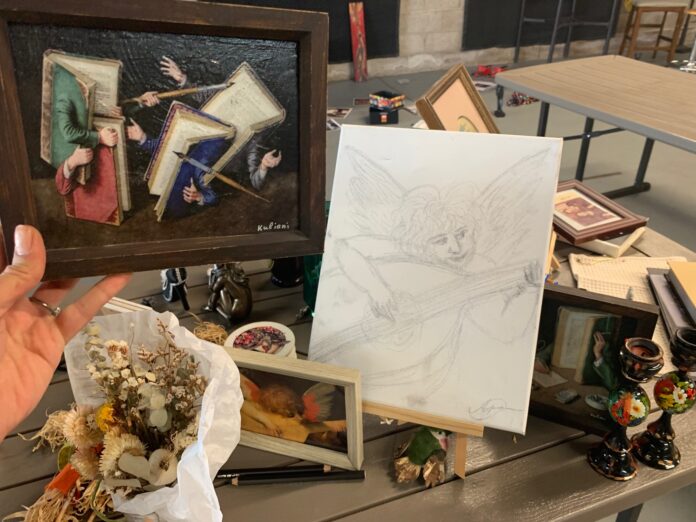Professor Victoria Juharyan emphasizes peaceful protest and the power of creation over destruction through art
By KAYA DO-KHANH — campus@theaggie.org
UC Davis Visiting Assistant Professor of Russian Victoria Juharyan stresses the power of art over violence regarding the crisis in Ukraine in her courses. She taught the course RUS 143 this past winter quarter, which focused on Chekhov, the late 19th-century Russian playwright and short-story writer.
Before Russia invaded Ukraine, the class was discussing Chekhov’s play “Uncle Vanya” and the character Dr. Astrov who was concerned with how future generations were going to view current generations.
After the invasion, the class considered Chekhov’s characters in relation to contemporary topics. Juharyan also shifted the final project from a traditional academic paper to one that allowed students the creative freedom to write a short story, play or to create art that dealt with current issues and channeled Chekhovian spirit.
Some of the students’ works were displayed in Juharyan’s interactive art exhibit titled “Faces and Voices of Interrupted Life and Unfinished Artworks” that was held at the Two Rivers Cider Company in Sacramento on March 13.
“The freedom that she gave us made me be able to connect to the war in a very personalized way, which is a lot more powerful, because if it was just a cut and dry essay where I had to pick a certain prompt, there would be a sort of distancing from myself and that distance would be applied to the current events,” fifth-year English major David Cruz said.
According to Juharyan, the final project had students producing manifestos, creating their own literary movements and writing poems that they did not know they had the ability to produce.
“Instead of just writing papers to get a grade or show some kind of superficial understanding of the texts we’ve studied, there are ways that they can create pieces that will live on both in their own lives and in the lives of others,” Juharyan said. “The work that they are doing is not just for me and the class, but for themselves and humanity.”
In her class, Juharyan talked with her students about the destruction of art and historical archives in Ukraine as a result of the war and the need to preserve such pieces.
She has been writing poems and painting since her childhood, and in her youth, she was concerned with the idea of knowing how to describe what has been lost.
“I hope this conflict […] is going to end up being a wake up call,” Juharyan said. “Maybe humanity somehow can realize that instead of destroying everything, we should be creating. We have those creative powers.”
Third-year psychology major Isabella Balboni’s creative final project was inspired by an incident related to the war that was discussed in class. A Ukrainian woman approached armed Russian soldiers and offered them sunflower seeds, as sunflowers are the national flower of Ukraine. She said, “Take these seeds and put them in your pockets, so at least sunflowers will grow when you all lie down here.”
Balboni created a drawing for her final project which portrays cupped hands holding sunflower seeds. The hands are dripping blood, chained at the wrists and the Russian flag peers out of the chains.
“The blood that’s dripping along with the reddened, bloody sunflower seeds are the people of Ukraine,” Balboni said. “These hands are trying to take something that doesn’t belong to them. […] The cupped hands of Russia represent not Putin but the Russian people […] — people who do not want this, it was not their choice to do this.”
Balboni expressed that she had not drawn in a long time and that nothing had inspired her to pick up a pencil and start creating as much as this project and the topics discussed in class.
“I would have not been able to truly understand the depth [of the war] and been given the creative freedom without her gift of a moment,” Balboni said. “It was truly a great moment, because I have not had a professor do that before.”
Written by: Kaya Do-Khanh — campus@theaggie.org




